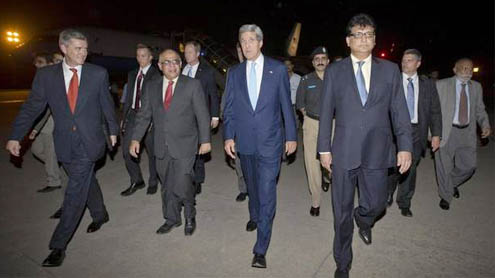
US Secretary of State John Kerry, considered a friend of Pakistan, has been changing his schedule to visit the country for over a month now. When he was due last month, he went to the Middle East straight from India.
Security is said to be the reason for shifting the dates. That does not mean that his visit is not important or is not being affected by the change in the schedule. There is a dire need felt in Pakistan to discuss and define the nature of the relationship between Pakistan and the US in the post-2014 scenario. The time has almost arrived for the US to leave this region, winding down the war in Afghanistan and leaving the country to an uncertain fate.
The question remains, are the people of Afghanistan ready and prepared to take the responsibility for their own future? What will be the equation of US-Pakistan contact in respect of Afghanistan once the US-led NATO forces are finally gone? Having a superpower in our neighbourhood made a significant difference in establishing Pakistan’s place in the comity of nations. There were strategic and financial benefits. Since the US was dependent on Pakistan for logistical, intelligence and other reasons, Pakistan had leverage to manage things according to its likes and dislikes on many occasions. This is going to change now.
If we insist on keeping to our old habit of deliberate ambiguity, the trick would not hold and might rather be ignored as an act of foolish hubris, leaving us isolated and once again branded a pariah state that cannot exist in peace with its neighbours. We cannot forget that the US, being the sole superpower, holds the key to different strategic avenues, amongst them economic, financial and trade benefits to Pakistan.
In the context of the war on terrorism, Pakistan has been the frontline state and the only non-NATO ally to join hands actively with the US in this endeavour. The relationship went well until it was disclosed through reliable CIA intelligence that Pakistan had been giving al Qaeda terrorists to the US while protecting the Afghan Taliban in safe havens along the Pak-Afghan border. This duplicity, though denied by Pakistan, coupled with its insistence that it had no trace of Osama bin Laden in Pakistan proved exceedingly embarrassing when bin Laden was found in the heart of Pakistan.
The roller coaster year of 2011 brought forth many abnormal aspects of US-Pakistan relations, one being the presence of innumerable ‘Special Americans’ in Pakistan such as Raymond Davis. Later on the Salala attack and the NATO blockade took relations to a new low. Having crossed that difficult milestone, and rebuilding the bad patch, it is now time to reconsider how to move forward with an effective cooperative relationship with the US. – DailyTimes











